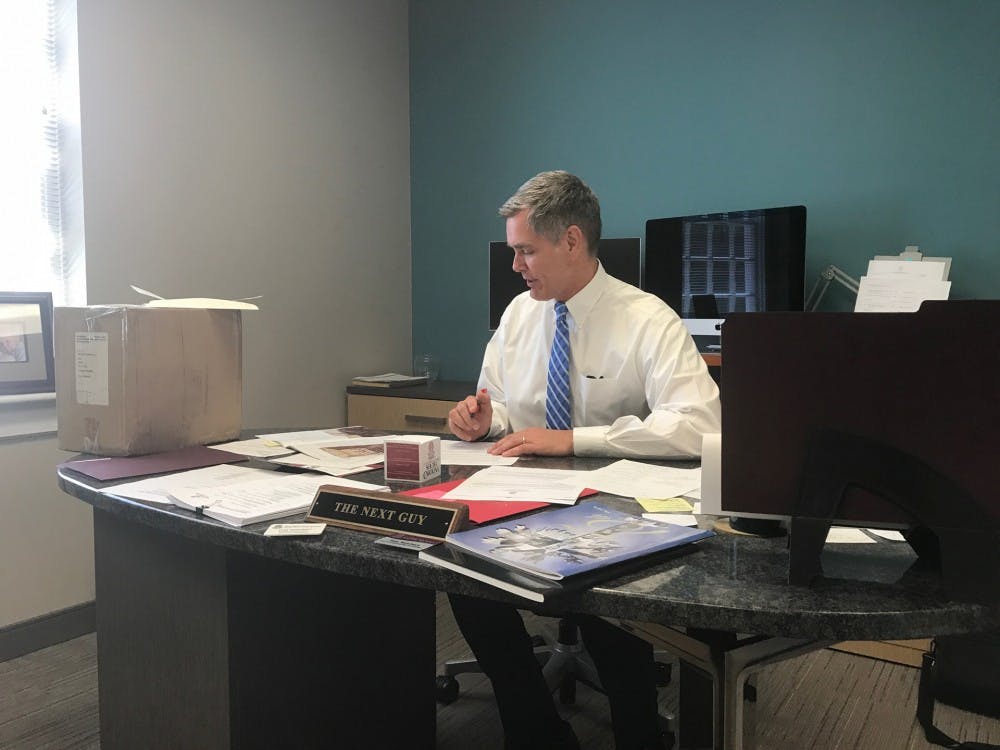University of Missouri alumni Tom Reichert and Sarah Gehlert are experts in different fields and come from different backgrounds. However, they have two things in common in addition to their alma mater: Both are in their first year as deans at the University of South Carolina, and both are looking to expand their colleges' spheres of influence.
For Reichert, the College of Information and Communications is relatively familiar territory. He studied journalism as an undergraduate and is a leading expert in advertising, one of the School of Journalism and Mass Communications' seven majors.
"It's a program with a long tradition ... and I've been aware of colleagues and scholars who teach here and have always been impressed with them," he said.
But still, the College of Information and Communications is more than just the School of Journalism and Mass Communications. It also includes the storied School of Library Science. Reichert hopes to learn the nuances of both schools while also increasing their cooperation.
"You've got kind of the best of the old and the new together," he said, "which I think kind of captures the best of the College [of Information and Communication] in a great way."
The merging of the the two schools was just one of the major projects completed under the leadership of Reichert's predecessor, Charles Bierbauer. The famous journalist-turned-celebrated-dean also led the School of Journalism and Mass Communications into its new building.
"He's just a wonderful individual, and I've gotten to know him well ... He's really done a lot to bring this College together, the two schools together," Reichert said. "I feel very fortunate that it is in great shape, the moral is great, the proper people are in place and people feel supported."
With a great deal of admiration for Bierbauer, Reichert hopes to utilize his advancements and build on his foundation.
"Wanting to take a program and build on its strengths to take it to the next level, I think both us probably have that in our DNA," he said.
Another of Reichert's main goals is to continue building the profile of the College of Information and Communication.
"I think this is a terrific program. I think that it's very well known within the state and among our alumni base, but I want to make sure that we have a strong national profile," he said. "I think that we're as good as a lot of programs across the country who might have higher or better awareness, so that would certainly be a goal."
Gehlert has similar aspirations for the College of Social Work.
"I also want to raise the profile of the College [of Social Work] nationally," she said. She plans to use her position as president of the American Academy of Social Work and Social Welfare "to let others know about the research being done at the College [of Social Work]."
Gehlert also wants to increase the College of Social Work's connections with the university's "other units," a pocket of potential that she said has been underused so far. She is still in the process of getting to know her staff, but looks forward to making strong connections.
"The experience has been good. There is both excitement about and resistance to change among faculty and staff," she said. "That puts the onus on me to be a strong leader while respecting the ... culture."
Indeed, Gehlert came into the job in large part due to connections to current staff. She was first approached about the position while visiting "former students now on the faculty."
"I had never considered being a dean, but they made a strong case" she said. "What attracted me was the strength of the faculty and the beauty of the campus."
Another pleasant surprise for Gehlert was the "strong ties" between the College of Social Work and state agencies.
"Our field education staff continues to impress me," she said. "They are stellar and are a big asset to the College [of Social Work]."
And the student experience, especially experiences beyond the classroom, is still a central focus of Gehlert's plans that she looks forward to expanding.
As they continue to define their roles at Carolina, both Reichert and Gehlert are governed in large part by a strong belief in the good that comes from their fields.
"Social work is a transformative enterprise," Gehlert said. "We work with communities to address problems, providing theory and scientific method, while appreciating the wisdom of the lived experience of community members."
For his part, Reichert sees positive responses to the journalism program.
"I don't feel like students are beat down and feel depressed," he said. "More than ever we're needed and I love that. I feel that's very much the attitude we need to have."

